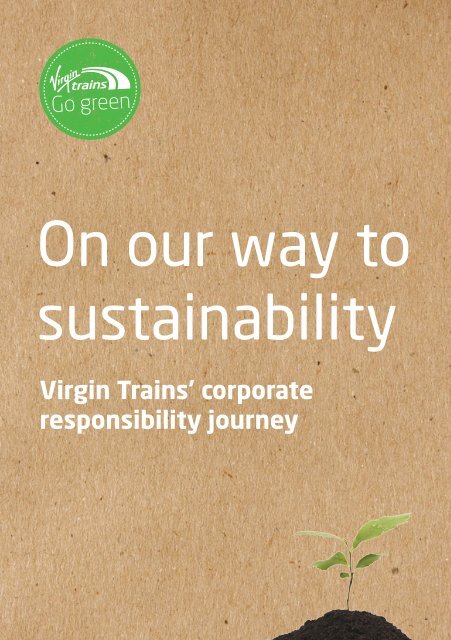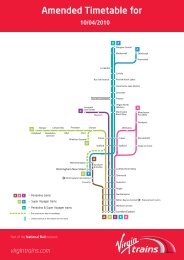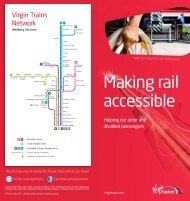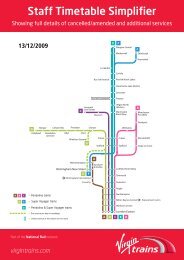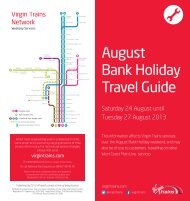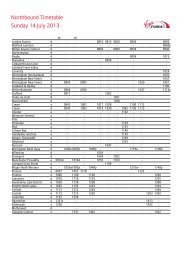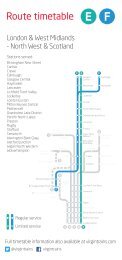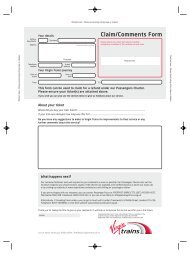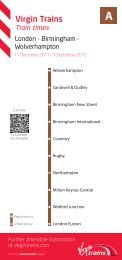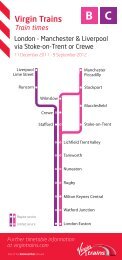corporate responsibility report - Virgin Trains
corporate responsibility report - Virgin Trains
corporate responsibility report - Virgin Trains
Create successful ePaper yourself
Turn your PDF publications into a flip-book with our unique Google optimized e-Paper software.
On our way to<br />
sustainability<br />
<strong>Virgin</strong> <strong>Trains</strong>’ <strong>corporate</strong><br />
<strong>responsibility</strong> journey
We issued our first <strong>corporate</strong> social <strong>responsibility</strong> (CSR) <strong>report</strong> in 2008 and I’m pleased<br />
to welcome you to this updated version. ‘On our way to sustainability’ is <strong>Virgin</strong> <strong>Trains</strong>’<br />
<strong>corporate</strong> social <strong>responsibility</strong> <strong>report</strong> that reflects our ongoing commitments to a sustainable<br />
business during the franchise extension period, which runs until 2017.<br />
Our original <strong>report</strong> set out strong commitments in a number of business sustainability and<br />
environmental aspect initiatives which are as valid today as they were back in 2008.<br />
Some commitments have been completed; others are longer term evolving targets that<br />
build on what we’ve learnt.<br />
Since 2008, we’ve developed our energy management programme to a level that led to the<br />
prestigious BS EN ISO: 50001 award in 2012. Additionally, this has been reinforced by BSI<br />
Kitemark certification of the data we use to monitor energy use and CO2 levels. The Kitemark<br />
award is based on a 2.5% reduction in CO2 emissions and we have chosen to use this as our<br />
target during the franchise extension period.<br />
Contents<br />
Chief Executive’s Foreword 1<br />
Our Targets 2<br />
A positive experience 8<br />
Environmentally sustainable 12<br />
Driven by people 18<br />
Stakeholder comment 22<br />
Sustainable Development 25<br />
But energy is only part of the story – a sustainable and environmentally efficient business<br />
involves many aspects in areas as diverse as waste management and prevention of pollution<br />
to community engagement. Our 2008 <strong>report</strong> recognised this, setting out a framework for<br />
future development. We intend to continue work in these and other areas and reinforce this<br />
by committing to the achievement of the British Standards BS EN ISO: 14001 Environmental<br />
Management. We will deliver this during the franchise extension period.<br />
We believe much of the 2008 <strong>report</strong> still forms the right basis of our sustainability<br />
commitments and we will continue with this programme of development until November<br />
2017, and hopefully beyond<br />
The <strong>report</strong> describes our activities around minimising our impacts; whether it’s the sourcing of<br />
food, working to reduce our carbon footprint, or managing our waste in a responsible way.<br />
It also describes the charitable activities that we undertake in partnership<br />
with <strong>Virgin</strong> Unite and our engagement with communities.<br />
Our vision for a sustainable and environmentally responsible business,<br />
through compliance to legal requirements and related industry standards<br />
will continue to be based on challenge, innovation, and always ‘wanting<br />
to be better’. This desire for continual improvement is what we strive for,<br />
and through our people and our customers, we will work toward delivery<br />
of this vision.<br />
Please have a look at the <strong>report</strong> and let me have your thoughts.<br />
Tony Collins<br />
CEO<br />
1
Sustainable stations<br />
Ongoing until 2017<br />
Where possible, we will encourage car-sharing amongst station staff going to, and coming<br />
from work. We will continue working to form partnerships with local stakeholders to increase<br />
share of customers using sustainable modes to access the station (i.e. by bus, train, cycling,<br />
walking, car sharing, and taxi).<br />
our targets<br />
We will continue to create improvements in accessibility for the mobility impaired (including<br />
parents with small children). Ramps/lifts are available at most areas of Stoke on Trent station;<br />
lighting, surfaces and signage have also been improved to provide accessibility and security for<br />
mobility impaired users. We will assess the benefits of any further reasonable improvements<br />
to station accessibility for our other stations.<br />
Sustainable sourcing<br />
Ongoing until 2017<br />
Facilities energy<br />
Working with Lorne Stewart we will source innovative methods and technology to reduce<br />
energy usage at our stations and offices.<br />
Waste & Recycling<br />
We will continue to prevent and reduce waste at all locations through the waste hierarchy,<br />
throughout the product life cycle.<br />
Provenance<br />
We continue to source local products and will always provide healthy, seasonal products that<br />
are environmentally and economically sustainable.<br />
Ethics<br />
We always work to apply the <strong>Virgin</strong> <strong>Trains</strong> Supplier Code of Conduct agreement to the entire<br />
supply chain.<br />
Safety and security<br />
By 2014, with ongoing improvements until 2017<br />
• Workforce lost time accidents not to exceed 16.1 per 1000 employees<br />
• Passenger injuries not to exceed 7.5 per million passenger journeys<br />
• Significant SPADs not to exceed 0.1 per million train miles<br />
• Train safety defects not to exceed 0.50 per million train miles<br />
2<br />
3
Delivering an Environmentally sustainable experience<br />
Achievement of a BS EN ISO:14001 accredited Environmental<br />
Management System by 2014<br />
Building on our success in the achievement of BS EN ISO:50001 Energy Management<br />
accreditation and Kite-Mark awards for Energy Reduction verification, we are looking at our<br />
broader environmental impacts and seek to demonstrate processes that meet BSI’s stringent<br />
standards criteria.<br />
Energy and climate change<br />
Reduction in carbon emissions until the end of the<br />
extended franchise period in 2017<br />
Ongoing until 2017<br />
Achieve a 2.5% reduction per annum in CO2 emissions from the trains we operate. We will<br />
make use of the metering equipment now fitted to our electric train fleet to promote the<br />
benefits of eco-driving with our driver colleagues.<br />
Stations energy management<br />
Ongoing until 2017<br />
Achieve a 2.5% reduction per annum in CO2 emissions from the stations we operate through<br />
delivery of station energy management strategy and enhanced energy efficiency awareness<br />
from our people.<br />
Waste<br />
Onboard recycling<br />
Ongoing until 2017<br />
The experience that is driven by people<br />
Employee and passenger engagement<br />
Ongoing until 2017<br />
We will continue to engage with all front line colleagues to provide support, coaching,<br />
empowerment and communication improvements to help develop team & individual<br />
potential – aimed at improving the customer experience.<br />
Green Network<br />
Ongoing until 2017<br />
Establish a communications network within the regions to utilise existing channels and with<br />
support of likeminded colleagues. Working alongside <strong>Virgin</strong> Unite in ‘Changing the Game for<br />
Good’ to promote our plans for delivery and operation of an BS EN ISO:14001 accredited<br />
‘environmental management’ system.<br />
Community Investment, <strong>Virgin</strong> <strong>Trains</strong> UK charity partnership<br />
Ongoing until 2017<br />
Our successful Charity partnership with CLIC Sergeant which raised over £500,000 came to<br />
an end in 2012. Whilst we operate during the franchise extension period, we will encourage<br />
our people to support local projects and community initiatives across our network.<br />
<strong>Virgin</strong> <strong>Trains</strong> set out to make a better journey possible and we like to think we’ve made a<br />
difference. But better is not just faster trains and more features; it’s also ethically sourced<br />
products, organic and easier access. All of which we’ve introduced.<br />
We will continue our programme of on board waste segregation working with Network Rail to<br />
increase the amount of on board recyclable waste at terminating stations.<br />
Reduce <strong>corporate</strong> waste and increase recycling<br />
Ongoing until 2017<br />
We successfully developed and implemented our driver PDA application, paving the way for<br />
devices to be used in-cab, particularly from a safety perspective and proving the successful<br />
operation and application of remote applications necessary to make the system work.<br />
We will build on this scheme to find new ways to minimise the use of paper based systems<br />
through the franchise extension period. Ongoing work will also continue to establish recycling<br />
facilities at all offices and depots through a green network of environmental champions.<br />
4 5
Our vision for a sustainable and<br />
environmentally responsible<br />
business will continue to be<br />
based on challenge, innovation<br />
and always wanting to be better.
a positive<br />
experience<br />
We want more people to travel by train, where it’s possible, rather than plane or car.<br />
We passionately believe rail transport is good for business, good for the planet and good<br />
for the people who live on it.<br />
Our customers expect us to get them to their destination, on time and in comfort, at<br />
reasonable cost. This is the basic promise that we must, and do, deliver as a successful<br />
business.<br />
But we go further. Our brand and our strategy are based around giving people the most<br />
valuable use of their time. If we’re going to be a sustainable business, then we need to<br />
maximise ease of access, and quality of the journey.<br />
What we’re doing<br />
Getting to the station<br />
Stoke-on-Trent station, which is managed by <strong>Virgin</strong> <strong>Trains</strong>, was chosen to be one of the pilots<br />
in a national Station Travel Plan (STP) project. Working with Stoke City Council, we promoted a<br />
range of travel options to improve access and reduce traffic. The plan involved the promotion<br />
of sustainable modes of travel (such as walking, cycling, public transport, car clubs and car<br />
sharing) as alternatives to single-occupancy car use.<br />
Integrated transport – that’s what our plans at Stoke were all about. It’s jargon for looking at<br />
the whole journey, from your front door to the door you want to get to. We want people to<br />
make the bulk of that journey by train, and we want to make the whole journey easier and<br />
more sustainable.<br />
That’s why we’re taking practical actions such as working toward integrating the rail timetable<br />
with bus services, publishing walking routes, and promoting the use of secure cycle storage.<br />
Our partnership with Brompton Docks has proved successful, with docks located at Stoke-on-<br />
Trent and Manchester Piccadilly stations.<br />
We believe that electric cars will continue to expand and develop, and so we’ve got the ball<br />
rolling to install electric car sharing points to a number of our managed stations. There’s little<br />
point in having an electric car if there’s no where to charge it – don’t worry we’ve got it sussed!<br />
Once you’ve made your low carbon journey to our stations we want the rest of your journey<br />
to be one of ease and comfort. That’s why we’ve made access to stations, like Preston’s<br />
subway, easier; we’ve made our service information during disruption clearer and we’ve made<br />
improvements to lighting and security so you feel safer. All this is continually reviewed and<br />
transferred throughout the route.<br />
We will continue to work with interested parties, such as Local Authorities and the Department<br />
for Transport, to share ‘what’s worked and what hasn’t’ so policy makers and operators can<br />
learn the lessons from this approach.<br />
8 9
The on-board experience<br />
We were the first train operating company to introduce Fairtrade drinks on all trains<br />
and at stations, and in 2009 we launched our sustainable First Class offer,<br />
featuring British produce as the cornerstone of the menu.<br />
We are uncompromising in our commitment to using free range poultry, eggs, outdoor reared<br />
meat and sustainable fish stock approved by the Marine Conservation Society.<br />
Our ethos has lead to recognition by Compassion in World Farming who have awarded us with<br />
their prestigious Good Egg, Good Chicken and Good Pig awards, from the RSPCA with their<br />
Good Business award and MIDAS (menu innovation & development awards) award for our<br />
innovative menu concept.<br />
Our catering supplier provides the food on all our trains as such they can have an important<br />
impact on sustainability. As part of our contract with them, we agreed a series of sustainability<br />
incentives, these included:<br />
• Reducing energy use<br />
• Reducing packaging waste and moving towards recyclable on board packaging<br />
• Providing healthy, seasonal products, that are environmentally<br />
and economically sustainable<br />
Our supplier also signed up to implement our Supplier Ethical Code of Conduct through their<br />
whole supply chain. We will continue to work closely with our supplier to ensure these factors<br />
are delivered sustainably and consistently.<br />
A safe and secure service<br />
Safety and security are absolute priorities for us. We publish an annual Safety Plan, available to<br />
all our people, which outlines our targets and commitments.<br />
This covers a wide range of areas where we have an opportunity (however small) to further<br />
improve our safety arrangements. We are extremely proud of our safety performance, which<br />
like all our performance, is rooted in the behaviour of our people.<br />
Our effort goes into maintaining a safe business. However, when incidents do happen, we<br />
properly investigate them and learn lessons to avoid repetition.<br />
Security<br />
Security is an important issue for both staff and customers. We have a ‘Violence at Work’<br />
policy which focuses attention on security risks and how we control those risks. It also acts as<br />
a means of engaging all employees on issues of violence at work.<br />
Our Secure Car Parks programme is making station facilities safer for both employees<br />
and the public. All the stations and car parks we operate have been accredited under the<br />
relevant schemes.<br />
The risk of terrorism is an increasingly significant issue for all rail operators. We undertake<br />
routine reviews of security at all our stations and on board our trains to ensure our<br />
arrangements are working at an optimum level.<br />
10 11
Environmentally<br />
sustainable<br />
Climate change is possibly the greatest global issue we face. As with all companies we have a<br />
role to play. We want to make that role as big as we can, focussing on increasing our efficiency.<br />
Waste is an issue - our waste management is good, but there is always room to improve.<br />
We have a history of positive environmental innovation. We were the first train operator to<br />
introduce regenerative braking to the UK and to run bio fuel passenger trains in the UK. We will<br />
maintain the focus on innovation as we move forward.<br />
As with many companies though, we control a certain amount of our impact, but only<br />
influence other areas. One such area is diesel versus electrification. We support ATOC’s stance<br />
in pressing for electrification to be a priority.<br />
In the meantime, we continue to use our high speed tilting diesel trains to operate services<br />
which diverge from electrified routes and to supplement electric trains where needed to<br />
maintain performance.<br />
Energy and climate change<br />
Generally speaking, trains are a lower carbon form of travel than cars or planes, though there<br />
are of course different footprints for different services. A successful service can help to<br />
reduce internal flights, traffic and carbon emissions.<br />
The launch of our high frequency service (we called it VHF) meant an extra 10 million seats<br />
a year. This could potentially help take an extra 1.3 million customers out of cars and planes<br />
every year, reducing the carbon footprint of the UK.<br />
The more recent work to extend our Pendolino electric fleet from nine to eleven carriages<br />
and the introduction of new Pendolino trains hugely increases our ability to carry many more<br />
customers.<br />
Getting more people to use trains is great for the transport system within the UK, but it<br />
doesn’t mean we don’t have to continue working on reducing our environmental impact.<br />
Our main areas of energy use are moving, cooling, heating and lighting our trains; as well as<br />
providing lighting and heating in stations, depots and offices.<br />
Over the past three years, we have engaged with the British Standards Institute (BSI) and<br />
have successfully implemented a BS EN ISO:50001 Energy Management System. The success<br />
of this system has been verified through the accreditation to the prestigious BSI Kite-Mark<br />
Energy Reduction Verification award.<br />
We will continue to work with BSI as we integrate the 50001 requirements into the broader<br />
and more challenging BS EN ISO: 14001 Environmental Management System.<br />
12 13
We pride ourselves on our people,<br />
and with good reason.<br />
<strong>Virgin</strong> <strong>Trains</strong> employees are<br />
the face and the ambassadors<br />
for the company.
On <strong>Trains</strong><br />
We run two different types of fleet - electric class 390 Pendolino and class 221 diesel Super<br />
Voyager trains.<br />
The class 390 fleet is acknowledged to be efficient in part due to their regenerative braking<br />
(Pendolinos return around 17% of the energy they use to the national grid when they brake).<br />
We have worked hard to minimise the environmental impacts of our Super Voyagers exhaust<br />
emissions by derating engines, which improves engine shutdown procedures at terminating<br />
stations.<br />
Where we can make a major difference on both types of train is by encouraging more efficient<br />
driving. Many people think a train just stops or goes, but as with cars, the way a train is driven<br />
can have significant impact on how efficient it is. We piloted energy metering and have<br />
rolled out this metering across our class 390 fleet, and together with an extensive training<br />
programme, we can improve energy efficiency through better driving techniques.<br />
We will improve this saving on our Pendolino trains through a variety of other measures based<br />
on efficient use of lighting, heating and air conditioning, what we call Hotel energy. Projects<br />
include maximising the efficiency of the heating and air conditioning systems, switching<br />
reading lights to a default off position and fitting LED lighting.<br />
At Stations<br />
As well as our work piloting station travel plans at Stoke-on-Trent, we also commissioned an<br />
energy survey at all stations to identify short, medium and long term opportunities. We began<br />
monthly energy <strong>report</strong>ing and a station league table to encourage energy efficiency amongst<br />
front line team. Key to this is the appointment of site level energy champions to share best<br />
practice and the creation of a ‘bottom up’ approach to energy reduction, empowering people<br />
to make decisions where they can have an impact.<br />
efficiency and reduce impact where possible, and were delighted that both have achieved the<br />
BS EN ISO:14001 Environment Management Standard, an acknowledged gold standard. This<br />
will help us as we work towards our own 14001 Environmental Management System.<br />
We haven’t left out the offices either. We have completed energy audits at our three main<br />
centres, in Birmingham, London, and Crewe. Typically, we identified several improvers including:<br />
• Ensuring the energy champion can monitor energy use to determine<br />
consumption patterns<br />
• Training a group of employees to use the building management control systems<br />
so that they can adjust the heating and ventilation<br />
• Engaging employees to ensure that lighting is switched off, heating turned down<br />
and monitors switched off<br />
Waste<br />
On trains and at stations<br />
Waste onboard the trains and at stations is another big and highly visible impact and is by far<br />
the largest part of our waste stream. That’s why we remain focused on tackling this area so<br />
can make the largest possible impact.<br />
We continue to work with and support Network Rail at their managed stations in ensuring<br />
that we can recycle as much of our on board waste as possible. This is achieved through<br />
cooperation between ourselves, cleaning contractors and Network Rail employees.<br />
At our own seventeen managed stations, we will continue to improve our rate of waste<br />
segregation with the ultimate aim of 100% diversion from landfill.<br />
In offices and depots<br />
We have developed an extra 4,000 parking spaces at 17 stations. As well as providing<br />
an important link in the chain of integrated transport, we are ensuring that the car parks<br />
themselves are as sustainable as possible. We have specified that designs include the re-use<br />
of materials, local sourcing and sustainable products where possible.<br />
Each of the multi-story sites (Stafford, Preston, Runcorn, Wigan, Birmingham and Rugby)<br />
include wind turbines to generate their own energy, at many locations lighting is controlled by<br />
photo-electric switches, meaning they come on when it’s dark and turn off when it’s light, to<br />
ensure efficient use only when required.<br />
In offices and depots<br />
94% of the energy our trains use gets our customers where they want to go. However, some<br />
energy is used getting the trains to and from maintenance depots, and while they are at<br />
depots. Our depots are run by Alstom and Bombardier. We are working with them to improve<br />
There is an impressive level of awareness and enthusiasm amongst our employees on green<br />
issues, and in each of our offices, stations and depots we are actively engaging with front line<br />
teams to maintain this passion.<br />
Champions will be invited to share collective knowledge and experiences and will have the<br />
support and resources from the Safety & Environment team to establish new schemes. This<br />
programme, driven by empowered individuals, mirrors our wider strategy to enable action by<br />
those who can have the greatest impact.<br />
We’ve also been at work developing our communication arrangements to minimise the use of<br />
paper. We’re taking a fresh approach to reducing paperwork, for example by further trialling the<br />
use of hand held information devices, through which frontline colleagues will be able to access<br />
real time information, publications, training and access WiFi.<br />
We want to get to the position where minimising waste is the default option for everyone.<br />
16 17
It’s the <strong>Virgin</strong> Way to focus on our people, product and partners and we intend to continue to<br />
deliver the best in the Railway.<br />
driven by people<br />
We will promote ‘Changing the Business for Good’ which emphasises sustainable development,<br />
and is driven by our people and customers. People are the centre of change and the heart of<br />
our vision for the future.<br />
Through this approach, we are providing a platform for change that will be embedded in the<br />
culture of the business. We will continue to deliver face to face communication and provide<br />
opportunities for involvement, empowerment and engagement.<br />
In the workplace<br />
We pride ourselves on our people, and with good reason. <strong>Virgin</strong> <strong>Trains</strong> employees are not<br />
only who the customers see and have a relationship with, but they are the face and the<br />
ambassadors for the company.<br />
Engaging our people in how <strong>Virgin</strong> <strong>Trains</strong> changes and develops is a core part of our<br />
philosophy. We believe in an open and honest environment, and we positively encourage the<br />
views and opinions of all our people.<br />
We want to give all our people the tools to have more empowerment within the company, to<br />
engage them in making it even better. We want to not only play the game but change it for<br />
good! We encourage our people to engage in workshops to understand the importance of how<br />
our business impacts on society and the planet and how their behaviours make an impact.<br />
We believe innovation and improvement will be driven by these changes, through a culture<br />
where everyone can innovate, making <strong>Virgin</strong> <strong>Trains</strong> better, thus benefitting everyone.<br />
Benefiting the community<br />
Railways join communities. We give people the means to see their friends and families,<br />
to visit places, do business, go shopping. We want to offer this to all.<br />
<strong>Virgin</strong> <strong>Trains</strong> has led the industry in offering easily accessible, value-for-money tickets.<br />
We were the first to offer internet bookings, and have since developed our website to make<br />
purchasing even easier. We make our Advance fares available as soon as we have train times<br />
confirmed to us by Network Rail, usually around 12 weeks in advance.<br />
Benefiting the economy<br />
We passionately believe that rail transportation has a very positive impact on the UK<br />
economy. We provide reliable and frequent services to key commercial centres such as London,<br />
Manchester, Birmingham, Glasgow, Liverpool, and Edinburgh as well as many regional towns<br />
and cities such as Wolverhampton, Stoke, Preston, Carlisle, and Holyhead.<br />
18 19
Supporting charities<br />
As proud partners with CLIC Sargent from 2010 our people came together to raise £500,000<br />
which has gone towards the care for children and young people with cancer and leukaemia.<br />
CLIC Sargent provide clinical, practical, financial and emotional support with the aim to help the<br />
whole family deal with the impact of cancer and its treatments. Although the partnership has<br />
ended we remain passionate about the work achieved by the charity.<br />
This might include ‘giving cash’ through payroll giving and fundraising, ‘giving time’ through<br />
team builds and volunteering opportunities, and ‘giving stuff’ through donating items to<br />
charitable causes.<br />
We have also worked closely with the Princes Trust and Centro, where a group of individuals<br />
were selected through a specially designed recruitment event. The selected individuals have<br />
been given the opportunity to work within the Princes Trust and Centro to learn and develop<br />
new skills that will equip them for future employment.<br />
We support <strong>Virgin</strong> Unite’s aim of “giving cash, giving time and giving stuff”. This involves<br />
every <strong>Virgin</strong> <strong>Trains</strong> employee to undertake at least one action that will improve the social and<br />
environmental lives of others.<br />
20 21
<strong>Virgin</strong> Management (51% shareholder in <strong>Virgin</strong> <strong>Trains</strong>)<br />
“<strong>Virgin</strong> <strong>Trains</strong> provide a low-carbon method of transport that allows its customers to visit some<br />
of the most exciting cities in the UK. The extension to operate the West Coast Mainline until<br />
2017 gives <strong>Virgin</strong> <strong>Trains</strong> a great opportunity to provide an innovative and customer focused<br />
service operating fast and sustainable trains. We support the targets to make Business as a<br />
Force for Good, because that’s what we are all about.”<br />
<strong>Virgin</strong> Unite<br />
stakeholder<br />
comment<br />
“Travelling by train is a low-carbon choice, and <strong>Virgin</strong> <strong>Trains</strong> make it easier for everyone<br />
to do that. <strong>Virgin</strong> Unite salutes <strong>Virgin</strong> <strong>Trains</strong> for achieving its 2012 goals to reduce its<br />
environmental footprint.<br />
<strong>Virgin</strong> <strong>Trains</strong> has greatly improved energy efficiency, reduced waste and ensured catering<br />
and other suppliers live up to <strong>Virgin</strong>’s high environmental standards. But why stop there <strong>Virgin</strong><br />
<strong>Trains</strong> has set ambitious targets for the next four years.<br />
They will divert 100% of its waste from landfill and reduce energy consumption by 2.5%<br />
each year until 2017.”<br />
Stagecoach Group (49% shareholder in <strong>Virgin</strong> <strong>Trains</strong>)<br />
“Growth and sustainability are at the heart of our strategy and our values. It’s right for<br />
our business, our customers, our people and our planet. Fairness, respect and a strong<br />
commitment to equal opportunities are central to our values and how we work.<br />
Our customers come first – and our focus is on new ideas and making things happen.<br />
We also believe in helping our people develop their skills and rewarding them for<br />
their performance.<br />
Every day, we help 3 million people lead more sustainable lives and we are working together<br />
to become even more efficient and cut our business impact on the environment. Stagecoach<br />
Group set itself a set of five-year targets in 2008-09 to help drive improvement. Overall, the<br />
Group was seeking a 3% reduction in fleet transport emissions per vehicle mile and an 8%<br />
absolute reduction in buildings emissions, with specific environmental targets for each of<br />
our businesses.<br />
The Group achieved its targets 12 months ahead of schedule. Compared to the size of its<br />
global operations, Stagecoach Group has cut the carbon impact of its business in the UK<br />
and North America by more than 20% in the past four years.<br />
To maintain the momentum of the Group’s programme, work is now underway to develop<br />
a new five-year strategy. This will include benchmarking our performance against other<br />
companies, identifying further cost-effective energy-saving opportunities, continuing<br />
investment to support our drive to become an even greener business, and setting new<br />
22 23
targets around carbon reduction and water consumption. We are a major employer in<br />
communities in the UK and North America, sustaining 35,000 direct jobs and also supporting<br />
thousands more through our supply chain. Stagecoach and its employees pay the UK<br />
Government over £300 million a year in payroll and business taxes.<br />
By attracting more people to public transport, we help fund public services. For many years<br />
the Group has invested between 0.5% and 1% of its profits in good causes.<br />
While we are getting a lot right, we also know we have more to learn and further<br />
improvements to make. We are committed to working in partnership with our customers<br />
and other stakeholders on our journey to become a more responsible, sustainable and<br />
successful business.“<br />
How we manage sustainable development<br />
We are working toward gaining BS EN ISO 14001 Environmental Management accreditation,<br />
which means the Environmental Manager working with top management all the way up to the<br />
front line.<br />
A new and improved Green Champion Working Group enables regular communication from<br />
across the business to achieve green targets and get engagement from our passionate<br />
people.<br />
We engage actively with our stakeholders both internally, through initiatives like our Green<br />
Champions Working Group, and externally in the rail sector. We are on RSSB’s Sustainable<br />
Development Steering Group and are active members of the ATOC Sustainability Forum.<br />
BSI ISO 14001<br />
Community<br />
engagement<br />
Top management<br />
engagement<br />
Environmental<br />
Manager<br />
External<br />
stakeholder<br />
engagement<br />
(e.g. <strong>Virgin</strong> Unite,<br />
RSSB, ATOC)<br />
Front line<br />
engagement<br />
24 25
Published by West Coast <strong>Trains</strong> Limited, a subsidiary of the <strong>Virgin</strong> Rail Group Limited.<br />
Registered in England No. 3007940.<br />
Registered office: The Battleship Building, 176 Harrow Road, W2 6NB.<br />
Head Office: 85 Smallbrook Queensway, Birmingham, B5 4HA<br />
Poduced by<strong>Virgin</strong> <strong>Trains</strong> Environment And Sustainability Working Group<br />
artwork courtesy of the <strong>Virgin</strong> <strong>Trains</strong> Brand Team


